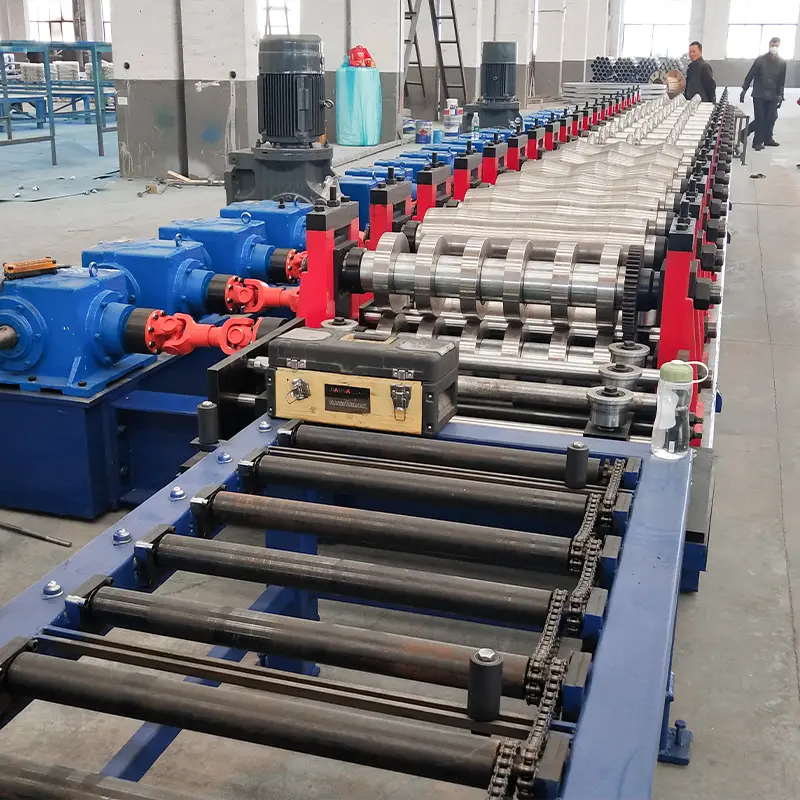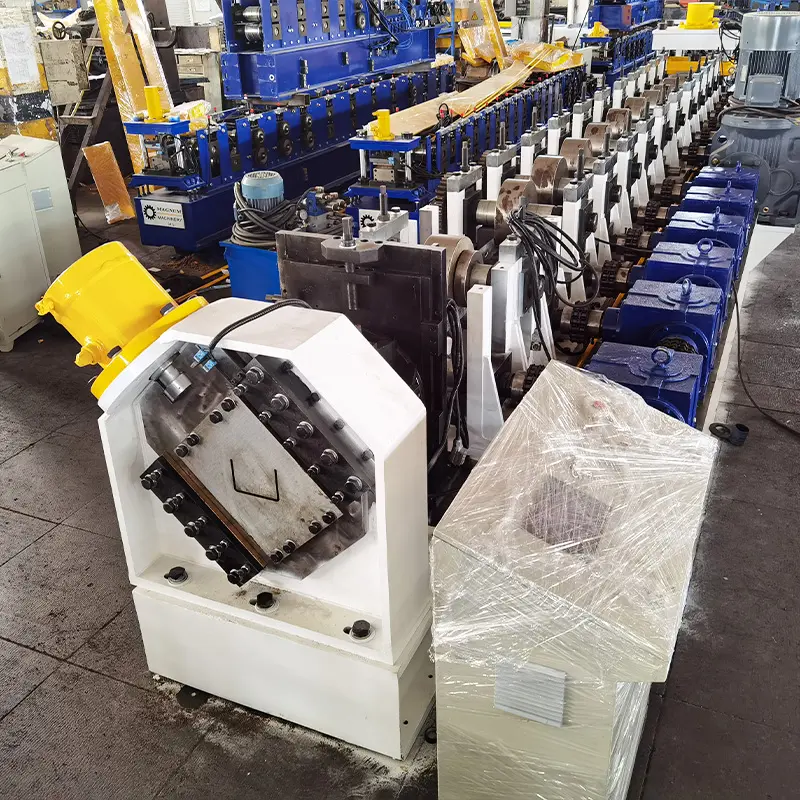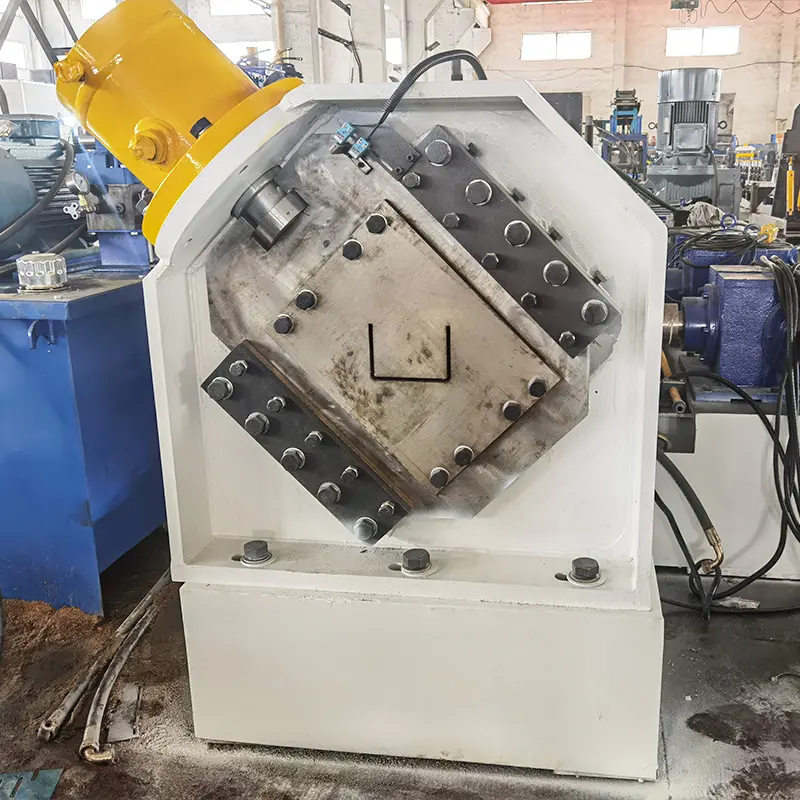Introduction of portable metal roll forming machine
Portable metal roll forming machines have revolutionized the metal fabrication industry in recent years. Also known as mobile roll formers or portable roll forming machines, they offer metal fabricators efficient and cost-effective solutions for producing premium quality metal parts.
Unlike stationary roll forming systems that require expensive foundations and extensive setup, portable roll forming machines are lightweight and flexible. They can be easily moved from one location to another and quickly set up for metal forming operations. With rapid deployability and exceptional versatility, portable roll formers enable metal fabricators to fulfill a wide range of customer orders without restrictions of space or production capacity.
This articles explores the key benefits of portable metal roll forming equipment that make it an indispensable asset for modern metal fabricators.

Flexibility in Production and Operation
One of the biggest advantages of portable roll formers is the exceptional flexibility they provide in production and operation. Here are some of the key ways portable roll forming systems enable flexible metal fabrication:
Easy Relocation and Quick Setups
Portable roll forming machines are designed to be quickly dismantled, relocated and set up with minimal effort. The average setup time for a portable roll former is 1-2 hours only. This enables metal fabricators to respond faster to changing production needs and easily move the equipment where needed. If a large order comes in, portable roll formers can be deployed to ramp up production capacity. They can be set up right next to the production floor, warehouse or even at the client’s site if required.
Suitability for Low to Mid Volume Production
Portable roll forming machines are ideal for producing low to medium production volumes efficiently. Their production output usually ranges from 1000 to 5000 feet per hour. This makes portable rolling equipment perfect for handling small to mid-size production runs. Metal fabricators can use them to profitably fulfill orders of 100 to 5,000 end-products.
Ability to Handle Varying Material Thicknesses
Portable roll formers can process sheet metal and coils ranging from 26 gauges to 1 inch thickness. This exceptional flexibility in material thickness enables metal fabricators to produce components of varying sizes and complexities without needing to invest in additional equipment. A single portable machine can handle production orders for thin gauge sheets as well as thick metal structures.
Formability for Diverse Metals and Alloys
Portable rolling mills can form different metals and alloys like galvanized steel, stainless steel, aluminum and copper. Metal fabricators can use the same machine to fulfill orders for diverse metal components without being limited by material type. Quick changeover and minimum setup time enables easy transition between different metals.
Compact Size Occupies Minimal Space
Portable roll forming equipment have a compact footprint ranging from 8 feet to 40 feet in length. They can be easily accommodated in limited spaces and moved through standard doors. This enables deployment directly on the production floor or near workstations. No dedicated foundations or space is required to install portable rolling mills.
Quick Changeover Between Profiles
Portable roll formers utilize quick-change forming heads that can be switched out rapidly to change profiles. Average changeover time is 15-30 minutes. This enables fabricators to switch between different custom profiles in a single production shift. Short changeovers allow accommodating urgent orders for new custom profiles even with small production runs.
Integration of Secondary Operations
Portable roll forming machines can be equipped with punches, cutoffs, embossing and other secondary processing capabilities. This enables completing multiple fabrication processes in a single portable setup. Secondary operations can be added modularly on the same machine as per application requirements.

খরচের দক্ষতা
Portable roll forming equipment provides exceptional cost efficiency that enables fabricators to maximize profits on every production order. Some of the ways portable rolling mills enhance cost-effectiveness are:
Low Equipment Investment
Portable roll formers require significantly lower upfront investment compared to stationary rolling equipment. A portable roll former costs just 20-30% of an equivalent stationary machine. The low equipment cost makes these machines accessible even for small or mid-size metal fabrication businesses with limited capital expenditure budgets.
Minimal Foundations Needed
Stationary roll forming lines require substantial foundations for installation which incur huge costs. Portable roll formers do not need special foundations since they are designed to be fully self-supporting. This drastically reduces set up costs.
Lower Energy Consumption
Portable rolling mills utilize advanced designs that minimize friction and energy losses. smart power transmission and drivetrain systems further optimize energy efficiency. The portable machines have 50-70% lower energy consumption compared to stationary roll formers.
শ্রম খরচ হ্রাস
The automated operation, quick set up and integration capabilities of portable rolling equipment minimize the labor needed. Just 1-2 operators can set-up and run the portable roll former. Automated size changing and integration of secondary processes reduces the forming labor significantly.
Lower Maintenance Costs
Portable roll formers are designed for rugged use with minimal maintenance needs. Easy access to all the components also simplifies routine maintenance. The maintenance costs are reduced by 40-60% compared to stationary rolling mills.
Scalable Production Capacity
Portable rolling equipment provides scalable production capacity at lower costs. Metal fabricators can start with a single portable machine and add more modules as demand grows. This incremental expansion costs significantly lower than upsizing stationary equipment. Temporary portable roll formers can also be brought in on rent to meet seasonal or temporary spikes in production.
Reduced Material Handling
Quick set up and relocation capabilities of portable rolling mills eliminate the need for extensive material handling systems. No dedicated conveyors or cranes are required as the equipment can be placed near the raw material and finished products location. This provides major cost savings.

Superior Quality and Consistency
While providing flexibility and cost efficiency, portable roll forming machines also ensure the forming quality matches or exceeds that of stationary rolling mills. The latest portable roll formers utilize advanced features that enhance formed part quality and consistency.
Precise Forming With Automated Size Control
Portable rolling mills use high precision forming rolls made from milled H13 tool steel that provides excellent surface finish. Automated gauging systems continuously monitor and adjust size to maintain extremely tight tolerances of +/- 0.005 inches throughout the production run.
Consistent Feeding and Alignment
Heavy duty rollers, automated feed systems and precision formed guides maintain consistent feeding and alignment of the strip. This prevents edge waviness and distortion. Integrated guiding systems also enable forming narrow width coils without misalignment.
Real-Time Monitoring and Control
Smart sensor systems monitor key parameters like temperature and speed in real-time. The data is analyzed by the machine controller to make instant adjustments that maintain uniform quality. If any process deviations occur, the forming operation is immediately stopped to prevent defective output.
Synchronized High Speed Production
All the milling, feeding, forming, punching and cutting operations are synchronized to enable high speed production while maintaining part quality. The entire process is optimized to maximize throughput without quality loss.
Advanced 3D Forming Capabilities
With advanced controls and precision components like box guides, some portable roll formers can handle complex 3D profiles that undergo sequential bending and twisting. The machines can form spiral ducts, complex panels, spheres and cones while still being portable.
Secondary Process Integration
Any secondary processes like punching, piercing, slotting, dimples etc. are integrated inline within the portable rolling mills. This avoids rough handling of partly formed strips and ensures pristine quality of the final formed components.
Superior Finish and Tolerances
The combination of precision rolling heads, tempered steel rolls, inline gauging and real-time monitoring ensures exemplary finish with tolerances up to +/- 0.005 inches. This capability matches and even exceeds stationary rolling mills.
Safety
While providing unmatched efficiency, portable roll forming machines also incorporate advanced safety features that enable reliable and incident-free operation.
Complete Enclosure With Interlocks
The entire forming area is fully enclosed with interlocked access doors that immediately disengage power whenever opened. All moving components are completely isolated from operators.
Emergeny Stops
Easily accessible emergency stop buttons are provided at multiple locations around the equipment. The machine can be completely shut down immediately in case of any unexpected situation.
Integrated Safety PLC
A dedicated safety PLC provides an additional layer of monitoring and control for promptly responding to any anomalies. Safety sensors shut down the system instantly if any parameter exceeds allowable limits.
Roll Speed Monitoring
Speed of each set of forming rolls is continuously monitored. If any abnormal acceleration or deceleration occurs, the machine is shut down to avoid mishaps.
Current and Load Monitoring
Load on the motors and drives is monitored in real-time. Automatic shutdown occurs if overload conditions are detected to prevent equipment damage.
Foolproof Material Feed
Precision alignment and positive gripping rollers ensure consistent material feed without misalignment that can cause jams. Optical sensors detect any feed issues and stop operation.
উপসংহার
Portable metal roll forming technology has completely transformed the economics and capabilities of metal fabricators today. Portable roll forming machines enable cost-effective solutions for rapid deployment, scalability, quick changeovers, small production runs, and integration of secondary processes – while still ensuring superior part quality and consistent high productivity.
With unmatched versatility, cost efficiency and quality capabilities packed in a rapidly deployable compact footprint, portable roll formers are an essential equipment investment for metal fabrication businesses of the future.
FAQ
What types of profiles can portable roll formers produce?
Portable rolling mills can produce almost all types of common structural, architectural, solar and component profiles including roofing panels, wall panels, trim, studs, track, channels, angles, tubes etc. Advanced portable roll formers can also produce complex 3D shapes.
What metal thickness can portable roll former process?
Most portable rolling mills have a thickness capacity range of 26 gauge to 1 inch. Larger portable roll formers are also available that can process metal coils up to 1.5 inch thickness.
How long does it take to set up a portable roll former?
Average setup time for a portable roll forming machine is just 1-2 hours. The quick set up enables relocation and production startup within a single shift.
What is the typical production speed of portable rolling mills?
Production speed offered by most portable roll forming equipment ranges from 1000 to 5000 linear feet per hour. Higher production speeds are also achievable with some advanced portable roll former models.
What is the average payback period for investing in a portable roll former?
For most metal fabricators, the cost savings and extra business enabled by portable roll formers results in a payback period of less than 12 months.
What size of facility is needed to operate a portable roll former?
Portable rolling mills do not need any special facility or foundation. They are fully self-supporting and can be deployed in any standard workshop or fabrication floor of sufficient length.
Can secondary processes like punching be integrated on portable roll formers?
Yes, most portable roll forming machine manufacturers offer options for integrating punching, shearing and other secondary processing within the portable rolling mill.
How many operators does a portable roll former require?
Most portable rolling mills are designed for operation by 1-2 persons. Automated size change, material handling and secondary processes minimize labor requirements.
What is the maintenance requirement for portable roll forming equipment?
Portable roll formers are designed for quick, tool-less component access to minimize maintenance. Just basic preventive maintenance like lubrication and inspection is required at regular intervals.
Frequently Asked Questions (FAQ)
1) Can Portable Metal Roll Forming Machines run on-site power sources like generators?
- Yes. Most portable roll formers in the 5–20 kW class can operate from 15–45 kVA diesel generators or hybrid battery-inverter carts. Verify surge current of servo cutoffs and ensure clean sine-wave output to protect drives.
2) What profiles are best suited for mobile/on-site forming?
- Roofing and wall panels, gutter/soffit, trims/flashings, studs and tracks, light channels, and solar racking profiles. Portable roll former cassettes make switching between panel ribs and trims feasible in 15–30 minutes.
3) How do I minimize transport-related misalignment after moving the machine?
- Use transport locks on stands, re-level with precision jackscrews, verify datum with a laser line or straight-edge bar, and run a 3–5 m test strip to check bow, twist, and camber before full production.
4) What tolerances can I expect in outdoor/on-site environments?
- With proper leveling and encoders, ±0.5–1.0 mm cut-length and ±0.3–0.8 mm flange/web repeatability are typical for 0.5–1.0 mm aluminum or GI panels; wind and temperature swings can widen tolerance bands without enclosures.
5) Are there special safety considerations for on-site operation?
- Yes. Use IP54+ rated enclosures, GFCI/RCD protection, lockable e-stops, cord management, and portable guarding. Follow ISO 13849 PLr assessment and local electrical codes; secure coil handling on uneven ground.
2025 Industry Trends
- Electrified drives and hydraulic-free cutoffs: All-electric portable roll formers are reducing energy use and oil-related maintenance, improving accuracy and cleanliness on job sites.
- Rapid cassette ecosystems: Vendors now offer standardized cassette libraries for panels, trims, and stud/track—cutting changeover to sub-20 minutes with recipe presets.
- On-site QA digitization: Low-cost vision modules and Bluetooth thickness gauges log SPC data to mobile apps, enabling field quality certificates.
- Lightweight materials and coatings: Higher adoption of Zn-Al-Mg (ZAM) and PVDF-coated aluminum for coastal installs; better corrosion resistance at lower weight aids mobile deployment.
- Rental and subscription models: Contractors increasingly rent portable machines or use pay-per-foot plans for seasonal spikes.
2025 Benchmarks for Portable Metal Roll Forming Machines (roof/wall panels, trims)
| KPI | 2023 Typical | 2025 Best-in-Class | Notes/Enablers |
|---|---|---|---|
| Setup time after relocation | 60–120 min | 20–45 min | Quick-level jacks, laser alignment, recipe recall |
| Changeover (cassette) | 20–40 min | 10–20 min | Color-coded cassettes, toolless pins |
| Line speed (panels, 0.5–0.8 mm) | 15–35 m/min | 30–60 m/min | Servo feeder + flying shear |
| Cut length accuracy (3σ) | ±1.0–1.5 mm | ±0.4–0.8 mm | High-res encoders, adaptive cutoff |
| Energy use (kWh per 1,000 m) | 50–70 | 38–55 | All-electric, regen drives |
| Crew size | 2–3 | 1–2 | Auto decoiler + integrated stacker |
| On-site scrap rate | 2.5–4.0% | 1.0–2.0% | SPC apps, coil QA, vision checks |
Selected references and data sources:
- AISI/CFSEI cold-formed steel resources: https://www.cfsei.org/resources
- ISO machine safety standards (13849, 14120): https://www.iso.org
- EN 10346 (coated flat steel products): https://standards.cen.eu
- U.S. EIA manufacturing and energy intensity data: https://www.eia.gov
- Cool Roof Rating Council (coatings guidance): https://coolroofs.org
Latest Research Cases
Case Study 1: Jobsite Panel Forming Cuts Logistics Emissions (2024)
- Background: A roofing contractor serving remote wind-farm sites faced panel damage and high freight costs shipping 12–18 m panels.
- Solution: Deployed a trailer-mounted portable roll former with all-electric drive, recipe library for three rib profiles, and a battery-buffered generator set.
- Results: Freight costs down 28%, panel damage claims reduced 72%, CO2e per project cut by 19% from fewer flatbed deliveries; average setup time per site 42 minutes; cut-length accuracy improved to ±0.7 mm.
Case Study 2: Portable Stud/Track Line for Modular Housing (2025)
- Background: A modular builder needed just-in-time studs/tracks near assembly sites to reduce WIP and warehouse space.
- Solution: Added a cassette-based portable roll former with inline punching and QR-coded recipe management; integrated SPC mobile app for QA logs.
- Results: Changeovers reduced from 35 to 14 minutes, on-site scrap from 3.2% to 1.4%, assembly takt time improved 11%; documented EPD data facilitated green building credits.
Expert Opinions
- Dr. Laura Kim, Director, Cold-Formed Structures Lab, University of Florida
- “For Portable Metal Roll Forming Machines, field conditions magnify coil quality issues. Specify tight thickness tolerance and monitor yield strength to maintain panel flatness and rib symmetry.”
- Diego Martín, Product Manager, DREISTERN Mobile Solutions
- “Cassette repeatability and servo cutoff calibration are the biggest levers for on-site accuracy. Customers see ROI in under a year by eliminating long panel freight and damage.”
- Priya Nair, TÜV-Certified Machinery Safety Engineer
- “Treat mobile lines like any industrial machine: conduct a PLr assessment per ISO 13849, use interlocked guards, and implement portable LOTO kits. Grounding and RCDs are non-negotiable on job sites.”
Practical Tools/Resources
- CFSEI Tech Notes for studs/tracks design: https://www.cfsei.org/resources
- AISI S100/S240 overview and cold-formed steel framing info: https://www.buildusingsteel.org
- OSHA machine guarding and LOTO guidance: https://www.osha.gov/machine-guarding
- Coil calculators (mass/length): https://www.onlinemetals.com/en/calculators
- NIST SPC/quality resources for manufacturing: https://www.nist.gov/services-resources/software
- Cool Roof Rating Council directory for coatings and reflectance data: https://coolroofs.org
- GHG Protocol tools for project emissions accounting: https://ghgprotocol.org
Note: Benchmarks reflect publicly shared manufacturer data and industry reports; always confirm capabilities with your specific portable roll former vendor, coil supplier, and local codes.
Last updated: 2025-10-21
Changelog: Added 5 targeted FAQs; provided 2025 trend analysis with KPI benchmark table and authoritative sources; included two recent case studies; compiled expert perspectives and practical resources tailored to portable roll forming
Next review date & triggers: 2026-04-21 or earlier if ISO 13849/14120 or AISI/CFSEI standards update, major vendor releases impact cassette/changeover performance, or market benchmarks shift by >10% in speed/accuracy/energy metrics
